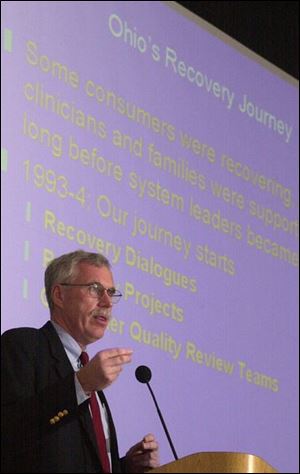
Recovery notion catches on
11/23/2002
Dr. Michael Hogan shows his audience at MCO's Dana Center that the state does have a roadmap to recovery for those suffering from mental illnesses.
Psychiatric researchers weren't dissecting it.
State bureaucracies weren't perfecting it.
In fact, for most of the history of mental illness treatment, recovery just wasn't talked about. For many years, in many expert circles, diseases such as schizophrenia and bipolar disorder - and those who wrestled with them - were written off as hopeless, or very nearly so.
Dr. Michael Hogan, head of the Ohio Department of Mental Health since 1991, said the recovery notion sprang not from the professionals, but from the real experts - those in the trenches. He heard about it from communities changing the way they treated mental illness, and from people like his sister, who is diagnosed with a mental illness.
From these beginnings, Ohio began changing the way it treated folks with various brain diseases, Dr. Hogan told an audience of 170 at the Medical College of Ohio's Dana Center yesterday .
The notion of recovery - the idea that people can survive and thrive - has been around long enough that the conference was called “Roadmap to Recovery, Revisited.'' The Toledo chapter of the National Alliance for the Mentally Ill and MCO's Coordinating Center of Excellence for Illness Management and Recovery sponsored the session.
In Ohio, the impact of the grassroots recovery effort was profound. Ohio mental health workers scoured the state to learn the tenets of recovery. As a result, they refashioned the state's program into a recovery-focused one.
“Ohio is doing more than just about any other state, in a very systematic manner, to address the problems of mental illness,'' said Dr. Mary Kay Smith, who directs MCO's Center of Excellence.
When President Bush put together a panel to study mental health in America, he chose Dr. Hogan to lead it. “We made an interim report which basically said, `Mr. President, it's a mess,''' Dr. Hogan said.
Research grew along with the recovery movement. One landmark study followed the lives of the severely mentally ill 25 years after they were locked in hospital back wards, considered the worst of the worst. Instead of hopelessness, investigators found people who were living successfully in the community.
Still, the state's system has shortcomings. Funding for mental health has not kept up with inflation. Health coverage for mental illness lags behind, said State Rep. Lynn Olman (R., Maumee).
The prison system and county jails hold people who should be in treatment, said James Mauro, state National Alliance for the Mentally Ill president. “We must muster together to create a public outcry that we will simply no longer tolerate the conditions our loved ones are living in,'' he said.